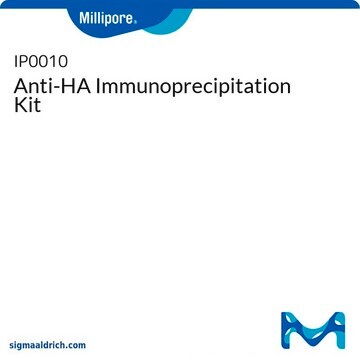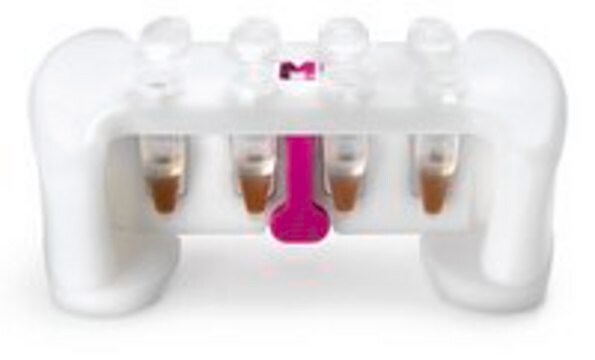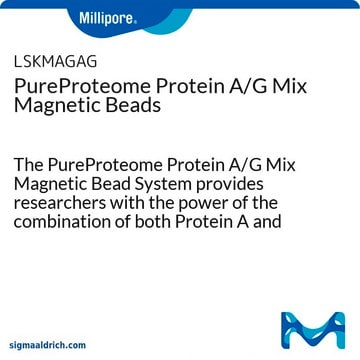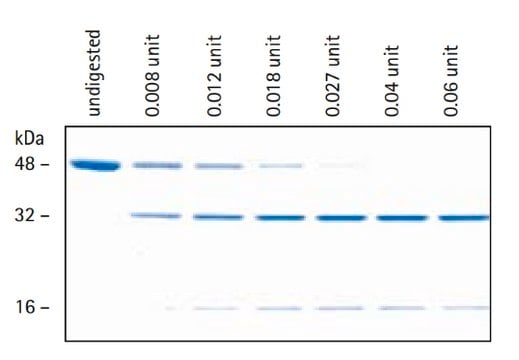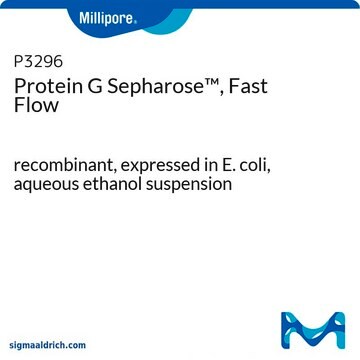11719394001
Roche
Immunoprecipitation Kit (Protein A)
sufficient for 20 reactions, kit of 1, suitable for immunoprecipitation (IP)
Se connecterpour consulter vos tarifs contractuels et ceux de votre entreprise/organisme
About This Item
Code UNSPSC :
12352200
Produits recommandés
Utilisation
sufficient for 20 reactions
Conditionnement
kit of 1
Fabricant/nom de marque
Roche
Technique(s)
immunoprecipitation (IP): suitable
Température de stockage
2-8°C
Description générale
Immunoprecipitation is a widely used method for the analysis of target antigens in complex mixture of proteins. The protein of interest can be concentrated and immunoaffinity -purified in one step on an analytical scale via a specific antibody. Often, immunoprecipitated proteins are functionally fully active and can be further analyzed with respect to enzymatic activity, interactions, modifications and structure.
Kit contains all reagents necessary for cell lysis, solubilization, stabilization, and immunopurification of proteins.
Application
Immunoprecipitation Kit (Protein A) has been used for the immunoprecipitation of proteins from cellular extracts with Protein A Agarose.
Conditionnement
1 kit containing 5 components.
Notes préparatoires
Working solution: Lysis buffer/wash buffer 1
The kit contains reagents for 125 ml of lysis buffer/wash buffer 1. Prepare at least a minimal volume of 25 ml, sufficient for four immunoprecipitations.
To prepare 25 ml of lysis buffer/wash buffer 1 mix 5 ml core buffer, 3.75 ml NaCl, 2.5 ml detergent mix and 1 cOmplete tablet. Add water to a final volume of 25 ml.
Solution is stable at 2 to 8 °C for 24 hours. When stored in aliquots at -15 to -25 °C, the solution is stable for at least four weeks. Mix thoroughly after thawing.
Wash buffer 2
The kit contains reagents for 50 ml of wash buffer 2. 2 ml of this buffer is required for one immunoprecipitation.
To prepare 50 ml of wash buffer 2 mix 10 ml core buffer, 25 ml NaCl and 0.5 ml detergent mix. Add water to a final volume of 50 ml.
Solution is stable at 2 to 8 °C. For longer periods, store aliquots at -15 to -25 °C. Mix thoroughly after thawing.
Wash buffer 3
The kit contains reagents for 25 ml of wash buffer 3. 1 ml of this buffer is required for one immunoprecipitation.
To prepare 25 ml mix 1 ml core buffer and 0.25 ml detergent mix. Add water to a final volume of 25 ml.
Solution is stable at 2 to 8 °C. For longer periods, store aliquots at -15 to -25 °C. Mix thoroughly after thawing.
The kit contains reagents for 125 ml of lysis buffer/wash buffer 1. Prepare at least a minimal volume of 25 ml, sufficient for four immunoprecipitations.
To prepare 25 ml of lysis buffer/wash buffer 1 mix 5 ml core buffer, 3.75 ml NaCl, 2.5 ml detergent mix and 1 cOmplete tablet. Add water to a final volume of 25 ml.
Solution is stable at 2 to 8 °C for 24 hours. When stored in aliquots at -15 to -25 °C, the solution is stable for at least four weeks. Mix thoroughly after thawing.
Wash buffer 2
The kit contains reagents for 50 ml of wash buffer 2. 2 ml of this buffer is required for one immunoprecipitation.
To prepare 50 ml of wash buffer 2 mix 10 ml core buffer, 25 ml NaCl and 0.5 ml detergent mix. Add water to a final volume of 50 ml.
Solution is stable at 2 to 8 °C. For longer periods, store aliquots at -15 to -25 °C. Mix thoroughly after thawing.
Wash buffer 3
The kit contains reagents for 25 ml of wash buffer 3. 1 ml of this buffer is required for one immunoprecipitation.
To prepare 25 ml mix 1 ml core buffer and 0.25 ml detergent mix. Add water to a final volume of 25 ml.
Solution is stable at 2 to 8 °C. For longer periods, store aliquots at -15 to -25 °C. Mix thoroughly after thawing.
Autres remarques
For life science research only. Not for use in diagnostic procedures.
Composants de kit seuls
Réf. du produit
Description
- Core Buffer
- NaCl
- Detergent Mix
- cOmplete Protease Inhibitor Cocktail Tablets (5)
- Protein A Agarose ready-to-use
Mention d'avertissement
Danger
Mentions de danger
Classification des risques
Aquatic Chronic 2 - Eye Dam. 1 - Skin Corr. 1B - Skin Sens. 1
Code de la classe de stockage
8B - Non-combustible corrosive hazardous materials
Classe de danger pour l'eau (WGK)
WGK 3
Point d'éclair (°F)
does not flash
Point d'éclair (°C)
does not flash
Faites votre choix parmi les versions les plus récentes :
Déjà en possession de ce produit ?
Retrouvez la documentation relative aux produits que vous avez récemment achetés dans la Bibliothèque de documents.
Les clients ont également consulté
Dual-specificity phosphatase 9 Protects against nonalcoholic fatty liver disease in mice through ASK1 suppression
Ye P, et al.
Hepatology, 69(1), 76-93 (2019)
J A Arnott et al.
Bone, 42(5), 871-885 (2008-03-04)
Connective tissue growth factor (CTGF/CCN2) is a cysteine rich, extracellular matrix protein that acts as an anabolic growth factor to regulate osteoblast differentiation and function. In osteoblasts, CTGF is induced by TGF-beta1 where it acts as a downstream mediator of
Yi Liu et al.
Cardiovascular research, 101(1), 87-96 (2013-11-29)
Toll-interacting protein (Tollip) is a critical regulator of the Toll-like receptor-mediated signalling pathway. However, the role of Tollip in chronic pressure overload-induced cardiac hypertrophy remains unclear. This study aimed to determine the functional significance of Tollip in the regulation of
Ding-Sheng Jiang et al.
Hypertension (Dallas, Tex. : 1979), 63(4), 713-722 (2014-01-08)
Cardiac hypertrophy is a complex pathological process that involves multiple factors including inflammation and apoptosis. Interferon regulatory factor 7 (IRF7) is a multifunctional regulator that participates in immune regulation, cell differentiation, apoptosis, and oncogenesis. However, the role of IRF7 in
Ke-Qiong Deng et al.
Nature communications, 7, 11432-11432 (2016-06-02)
Although pathological cardiac hypertrophy represents a leading cause of morbidity and mortality worldwide, our understanding of the molecular mechanisms underlying this disease is still poor. Here, we demonstrate that suppressor of IKKɛ (SIKE), a negative regulator of the interferon pathway
Protocoles
Immunoprecipitation Kit (Protein A) Protocol & Troubleshooting
Notre équipe de scientifiques dispose d'une expérience dans tous les secteurs de la recherche, notamment en sciences de la vie, science des matériaux, synthèse chimique, chromatographie, analyse et dans de nombreux autres domaines..
Contacter notre Service technique




